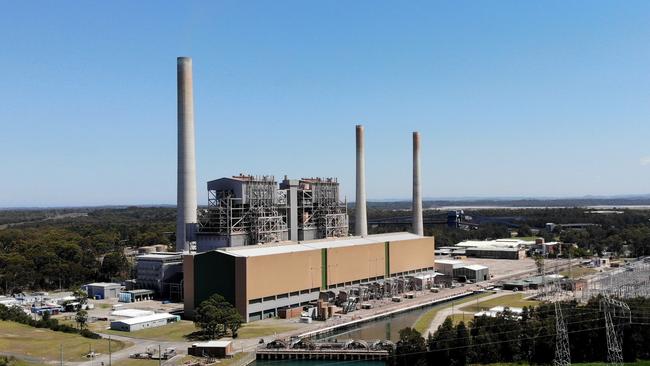Trevor St Baker and Brian Flannery take Vales Point coal station hit as profit plunges
Rich-listers Trevor St Baker and Brian Flannery have slashed the value of their coal station in NSW and scraped a modest $10m annual profit amid tough market conditions.

Business
Don't miss out on the headlines from Business. Followed categories will be added to My News.
Rich-listers Trevor St Baker and Brian Flannery have slashed the value of their NSW power station after a steep fall in annual profits as pressure grows on the role of coal generation in Australia’s power grid.
The value of Vales Point power station near Lake Macquarie, which supplies about 4 per cent of power for the national grid, was chopped to $156m for the 2021 financial year compared with $555m three years ago while annual profit slumped 93 per cent to $10m, documents lodged for Sunset Power International with the corporate regulator showed.
The plant has delivered bumper profits since the business duo bought it for just $1m from the state government in 2015.
But rampant renewable energy supplies have rapidly eroded the influence of coal in the market and led to a sustained period of low power prices, piling pressure on the profitability of ageing generators including Vales Point.
A lift in renewable generation and lower demand for electricity due to the pandemic led to lower prices and cuts to production at Vales Point, filings show.
Experts expect coal plants may be forced to close earlier than planned retirement dates given their difficulties competing with renewables.
Delta Electricity, which operates Vales Point, said it will still run the station until 2029 and expects other high-cost plants to drop out first.
“The market needs baseload plants. Obviously the transition is happening, but it‘s going to be the high cost ones that will drop out probably sooner,” Delta chief executive Greg Everett said.
“I think that phenomenon might change a little bit as we get further into the energy transition and it‘s just going to be the higher cost ones that will have to probably quit.”
Still, the Institute for Energy Economics and Financial Analysis said the Vales Point accounts showed the pace of the energy transition, calling for the need to roll out infrastructure and transmission that can deliver renewable supplies to market.
“As more renewables come into the system, displacing incumbent generation and pushing wholesale prices lower, coal generators are struggling to maintain their historical profits, and could exit earlier than expected. A mechanism to manage the exits would provide certainty to communities and the energy industry regarding when the coal generators will close,” said Johanna Bowyer, the IEEFA’s lead research analyst for Australian electricity.
“Federal and state governments need to urgently set in place policy to enable renewable infrastructure to be rapidly built.”
A $10m dividend was paid for 2021 from $62m a year earlier with the Sunset owners continuing investment in the Chain Valley mine which supplies Vales Point, after buying out the facility in 2019 following its collapse into administration.
Delta said the looming closure of AGL Energy’s Liddell coal plant, which will hike NSW power bills in 2022-23, had led to higher contract futures prices in 2022.
“I think it’s more that people are starting to get their head around what life without Liddell looks like and maybe it is a bit higher cost and a bit lumpier than people might have thought,” Mr Everett said.
“And that’s always been our view. We don’t think that you can easily just remove baseload and carry on.”
NSW Energy Minister Matt Kean has said the nation’s coal plants could be tipped out of the electricity market earlier than planned with their owners under financial pressure and solar increasingly undercutting the fossil fuel’s profitability.
Vales Point is due to close units from 2029 with Origin’s Eraring a year later, according to AEMO, but facilities are increasingly having to switch off during daytime hours when high solar supplies undercut them on price.
Big energy producers and users have been raising fears over a plan by the NSW government to underwrite investment in renewable and storage generation, saying the move would distort market signals and detract from a national approach underway.
Originally published as Trevor St Baker and Brian Flannery take Vales Point coal station hit as profit plunges



